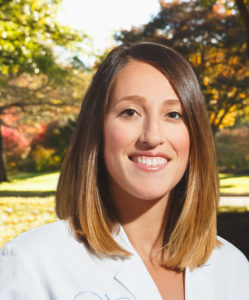

Dr. Christina McWhorter, an OB/GYN with Virginia Women’s Center in Mechanicsville, VA talks about common breastfeeding challenges.
When Dr. Christina McWhorter gave birth to her first child, she thought breastfeeding would be easy. Why wouldn’t it be? she thought. I know all about this.
“Of course I had a horrible time,” she says, laughing. “You think because breastfeeding is ‘natural’ it will work perfectly—but sometimes that’s not the case.”
Dr. McWhorter wants all her moms to know that breastfeeding can be a challenge, and that’s OK. Sure, nursing is natural — but “it’s not going to come naturally and easily to everyone,” she says. Here are her tips for nursing moms.
Don’t hesitate to ask for help with breastfeeding.
One of Dr. McWhorter’s new moms kept trying to pump breastmilk, and nothing was happening. “I’m never going to be able to do this,” she said, utterly frustrated. “I’m pumping for 40 minutes and getting nothing.” As it turned out, she wasn’t doing anything wrong; the pump was just broken. With a new breast pump, she was fine.
The moral of this story: If you’re having trouble breastfeeding, don’t assume you’re doing something wrong! Instead, ask your doctor for help. For pregnant women and partners, Dr. McWhorter recommends the breastfeeding classes offered through Bon Secours. After birth, Richmond moms can get personalized help from a lactation consultant. And if you’re producing enough milk but are experiencing nipple pain, you don’t need to suffer. “There are creams we can give so they’re not miserable,” Dr. McWhorter says.
There’s help for flat or inverted nipples.
Some moms have a hard time breastfeeding because their baby can’t latch onto a flat or inverted nipple. One solution is to use nipple shields — a flexible silicone nipple worn over the mom’s nipple — to assist with breastfeeding after delivery. These can help newborn babies latch on, although they’re not meant to be worn long-term. Also, Dr. McWhorter says, pumping right before a breastfeeding session can make the nipples less flat.
Not all pumps are created equal.
Did you know that your insurance will probably cover the cost of a new breast pump? Call your insurance to find out, Dr. McWhorter tells her moms, and “get that free pump!” Before you buy, however, ask your doctor for recommendations, as some brands are better than others. Dr. McWhorter prefers Medela and Spectra brands.
Natural supplements can help increase milk production.
Many natural remedies do work to improve milk production. Dr. McWhorter often recommends fenugreek, an herb that has been used by nursing mothers for thousands of years. Mother’s Milk tea is another herbal product that can boost milk production. Increasing fluid intake is essential, and adding oats and flax to your diet can also help. Instead of buying pricey lactation cookies, Dr. McWhorter says, make your own!
If you can’t breastfeed, that’s OK.
Moms feel a lot of pressure to breastfeed — pressure from society, from pediatricians and from themselves. Sometimes moms who can’t produce enough milk feel stressed out and frustrated. It’s all right, Dr. McWhorter tells them: “I end up giving a lot of reassurance to people who aren’t able to breastfeed, for whatever reason.” It’s fine to use formula. What matters, she says, is that your baby is eating and growing.
![]()
![]()


Dr. McWhorter enjoys many aspects of obstetric and gynecologic care. She has a particular interest in working with teens and young women as she enjoys educating them on contraception options and family planning. She is able to provide a myriad of contraceptive options to her patients including long-acting, reversible contraception. She also has a special interest in minimally invasive surgery including hysteroscopy and laparoscopy.
Dr. McWhorter is especially passionate about obstetrics. She enjoys caring for women with both low- and high-risk pregnancies, including women who desire vaginal births after cesarean sections (VBACs). Dr. McWhorter is excited to return to her home state of Virginia. When she is not working, she enjoys yoga, cooking and baking, and most of all spending time with her husband, son and daughter.
—-Virginia Women’s Center has four locations in the Richmond, Virginia metropolitan area as well as a much-loved office located on the Northern Neck, in Kilmarnock, Virginia.





